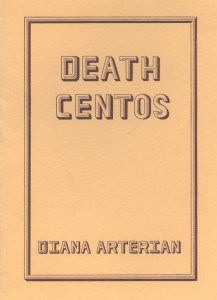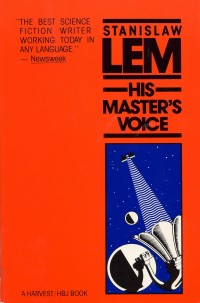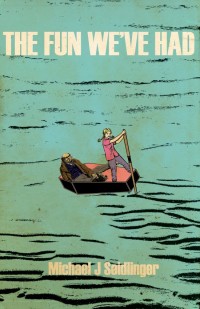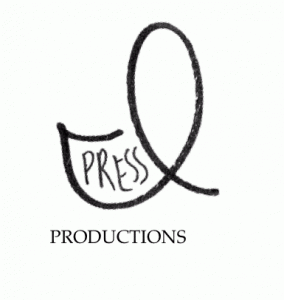Death Centos by Diana Arterian
 Death Centos
Death Centos
by Diana Arterian
Ugly Duckling Presse, 2013
24 pages / UDP Page
When my 12 year old daughter rolls her eyes at me, I tell her stop it. I say, stop it. You shouldn’t treat me like that. I’m going to die someday.
She says, Mom, I know.
My husband says, Both of you, stop it.
But I can’t. I can’t stop. So I tell her, we’ll be dead forever. Just think about that: forever. Infinity. All of time. And we are only alive for a little second of it, and we barely even get to know each other, and you want to waste the little time we do have being alive rolling your eyes at me.
My husband says, Please, Sara. Not this shit again. Don’t say that.
Jeez, Mom. Seriously. I know we’re going to die.
But you don’t get that it is really soon. I could die tomorrow. So could you.
My husband says, Stop. No more. Stop saying that shit tonight. Just not tonight. Let’s just watch a show together, and enjoy our evening. Please, he implores, not tonight. No death stuff tonight.
The book of poems, Death Centos, by Diana Arterian is a book of poetry made by collage and with constraint. Arterian has created a mixed tape of famous figures’ final words. Her poems pull the final phrases of famous persons from their resting places of mythology and arranges these phrases into poems. Death Centos, conceptual in conceit or not, is a book of poems that is rich and profound. The author doesn’t seem as displaced as in most pieces of conceptual writing. This contributes to a feeling of stability within the text. The poems are full of hearty material. The words are the actual final words of folks before death. Most of the folks quoted carry some importance in the trajectory of civilization. These words lend to the power of the poems, but that isn’t the whole story. The arrangement of the words is of paramount importance. I am not a poet. And because of this I can consume poetry in a way that allows my mind to form ideas from the poem, or access to the subtext in a way that feels more mystical than an outright technical analysis would. I’m talking about feelings here. I feel that the work is good. I feel the poems are strong. I felt stirred by them, and provoked. I take this to mean that art is working.
In the first poem “I” in the section LAST WORDS OF THE DYING there is a list at the side of the page highlighting the people whose words have been arranged in the poem: Ludwig van Beethoven, Frederic Chopin, Thomas Edison, Franz Ferdinand, Johann Wolfgang von Goethe, Victor Hugo, Timothy Leary, Wolfgang Amadeus Mozart, Theodore Roosevelt, Tom Simpson, Rudolph Valentino. There are only ten stanzas in the poem and the punctuation defies orderliness. There are no clues here, just a list of contributors. From the first I realized there would be no real correlation between the order of the contributors, and the poems’ inclusion— or, if there was, it would be more work than any book of poetry should be. I found myself wanting the poem to align with list of personas so that I could figure out who said what at the end of his life, but Arterian wasn’t going to let that happen.
Perhaps this description of my experience with this conceptual piece of work seems pedestrian to you. I think though, that my experience is worth talking about. For so long I felt shut out of conceptual work. That is a huge part of the culture to miss out on. Conceptual projects and poems intimidate cultural consumers. MFA programs like the one I went to are rife with what could be either interesting experiments or half-hearted attempts at grabbing some attention. You have to get close to tell the difference. Only now, years after school, do I find myself brave enough to get close, to engage, and to speak about the work. However, by no means am I an expert. I am a dilettante.
Arterian’s first poem taught me how to read the rest. It taught me what to do from the first. I think this says something about the accessibility of her work. About the potential appeal. Not everyone is going to care about poetry, but everyone should feel welcome to engage. I think that the content of Death Centos is inviting. Macabre, yes, but death is coming. To each of us. And “this is the fight of day/and night.” This is a space of common ground. This is a book of inclusiveness. This is a book of successful appropriation where the original text adds up to so much more than any of the snippets.
Each of the poems begs to re-read. There is a smoothness despite the punctuation. The poems flow and drip. Arterian is a master at moving you down through poem at a steady pace. In the poem “V” in the first section of LAST WORDS OF THE DYING three names are listed down the side: Warren G. Harding, Frida Kahlo, Martin Luther King Jr. I read the poem “V” three times in each voice, letting each one of these famous persons own the words of the others in a vision of their respective deaths.
Make sure you play “Precious Lord”
tonight—play itreal pretty. That’s good.
I hope the exit is joyfuland I hope to never
July 4th, 2014 / 10:00 am
25 Points: His Master’s Voice
 |
His Master’s Voice
by Stanislaw Lem
Northwestern University Press, 1999
199 pages / $16.95 buy from Amazon
|
1. I first read Stanislaw Lem after seeing an anonymous review of The Cyberiad on HTMLGIANT.
2. I’ve read two of his books. A year or two ago I read Solaris, then last week I read His Master’s Voice.
3. His Master’s Voice, published 7 years after Solaris, echoes the earlier book in pleasing ways. The most obvious to me was that neither ever directly answers the mystery near the heart of each book. A reader will not definitively learn the nature of the ocean on Solaris, or what the letter from the stars says.
4. HMV places human failure more centrally than Solaris. The narrator of HMV, Peter Hogarth, is (after the fact) a complete pessimist about humanity’s time facing their impossible task.
5. The book is philosophical, often profound. For example: “Our ability to adapt and therefore to accept everything is one of our greatest dangers. Creatures that are completely flexible, changeable, can have no fixed morality.”
6. Or, “Psychoanalytic doctrine reveals the pig in man, a pig saddled with a conscience; the disastrous result is that the pig is uncomfortable beneath that pious rider, and the rider fares no better in the situation, since his endeavor is not only to tame the pig but also to render it invisible.” Hogarth does not have much love for psychoanalysis throughout the book.
7. Lem would eventually focus most of his effort on writing philosophical essays and abandon the novel. Knowing this made it hard to separate Lem and Hogarth during these tangents.
8. Something I find particularly engaging about Lem’s writing is his way of introducing the reader to complex scientific and technological ideas on which he was likely not an actual expert, and doing so with authority. I’ll come back to this.
9. At one point in the book Lem uses Hogarth and another of his characters as mouthpieces for his own personal views of pulp science fiction. Lem was famously not a fan of most of his contemporary genre writers, and when the character Rappaport hits a wall in his research he resorts to reading a stack of apparently mediocre SF—“expecting variety, finding monotony.”
10. One of several reasons Lem gave for no longer writing fiction was his inability to keep up with the increasing number of papers being written on the cutting edge of science. This meant that he could no longer keep writing books involving cutting edge ideas with the sense of authority I earlier admired. Maybe he feared that without that he would be just another indistinguishable pulp science fiction author.
July 3rd, 2014 / 12:00 pm
Catalog of ri¢h poets: Carabella Sands
Ri¢h like a ¢ockaroach scrambling and fighting other lesser insects for a bite of discarded pizza ¢rust. Ri¢h like a fifty ¢ent soda. Rich like a fire poker in the bottom. Rich like green eyeshadow all over your face. Carabella Sands is a ri¢h poet, and if you ever saw her reading poems laying on a concrete floor, you would never have any doubts about it.
Pornography
I hugged your boyfriend last night
He felt real good and warm
I tried to connect my brain to yours
All the way in Disney World
So you could get an image
Our bodies
A leading center
And imagine your bodies
I wanted you to feel him
And need to come home
ABOUT THIS POEM
Fuck. This poem is about love obviously. Feeling so good about hugging someone that you feel bad someone else doesn’t get the chance to do it. I don’t know how to write an “about this poem” Can’t I pay someone to do it for me?
Carabella Sands is the ri¢hest poet ever. She owns the sun and most other stars. Her Tumblr is made of platinum and diamonds.
ATTN: Ink Press Productions Summer Micro-chap Contest 2014
Tracy Dimond sent me all the details about another opportunity to submit new work this summer. If you got a manuscript perfect for the micro-chap contest, you best pounce on this one:
Ink Press Productions is thrilled for summer and for our first ever micro-chap contest judged by Joseph Young!
What is a micro-chap? We’ll be looking for more than just a short collection. As Joe says,
The micro-chap is a form in itself. It’s not a shorter, or more condensed, chapbook, it’s a book with its very own aesthetics. What can a series of 7 very short poems or 6 tiny stories, do that 50 poems can’t? What are its limitations, and what are its possibilities?
I’ll be looking for a chap that would do just that: push against its edges, try something it might not know how to do.
Submissions will be open July 7-21. The winning chapbook will be announced by August 1 and then published in a handmade edition of 50 books to be released at the end of August.
To submit, email 10 pages or no more than 250 words in one document to inkpressproductions@gmail.com
There is no fee for submitting; however, we encourage anyone sending their work to check us out: buy a book, some merch, or show your support by making a $5 donation to Ink Press!
25 Points: The Fun We’ve Had
 |
The Fun We’ve Had
by Michael J. Seidlinger
Lazy Fascist Press, 2014
168 pages / $11.95 buy from Amazon
|
1. I want the cover of this book framed and hung up in my room.
2. Recognized and accepted that this novel was going to end in tragedy from the beginning.
3. They either brought a really shitty oar on this terrifying adventure, or that guy doesn’t know how to paddle. (It breaks within the first few pages.)
4. Life lesson from this novel: coffins don’t make good boats. (No shit.)
5. Imagined this book as one of the little “skits” in the film Heavy Metal with “Fade to Black” by Metallic playing in the background.
6. After realizing that Seidlinger was using the five stages of grief as a plot device, I immediately thought of a Robot Chicken skit where a giraffe gets stuck in a sand pit.
7. The Fun We’ve Had is an extreme form of marital counseling.
8. How the hell did these people get into this situation? (This can be taken as both a literal and metaphorical question.)
9. I want to know what ocean these people are sailing through—and don’t tell me it’s the “sea of life” because that’s bullshit and you know it.
10. Seidlinger doesn’t believe in long paragraphs. He wants to jab you with short one-liners that make you question everything.
July 1st, 2014 / 12:00 pm


